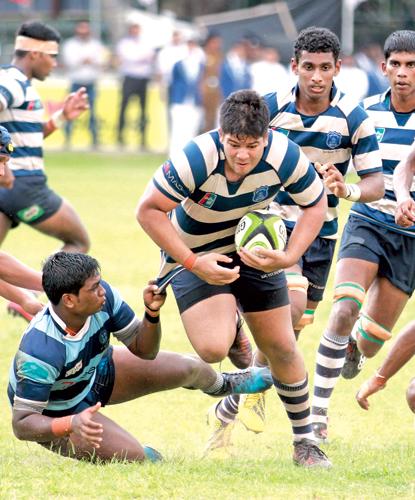
Amateurish school rugby officials have been found guilty of paving the way for the disruption of a weekend of high profile championship-deciding matches one of which was a game between two protagonists for the title.
The match was to take place on Saturday between the crowd-exciting St. Peter’s College team with a prided rugby history of 86 years, and a patronized St. Joseph’s College team that has added more punch to a tournament that has overshadowed all other domestic sporting events in the country.
Run by an entity called the Sri Lanka Schools Rugby Football Association (SLSRFA), the championship has been found wanting in professional management and accountability with no emphasis on match security and player safeguards that resulted in abuse, spectator assaults and hooliganism at a match featuring defending champions Royal College and an underdog Wesley College who almost turned tables last week.
School rugby officials are well known for their lethargy with little or no rugby backgrounds and have now been told by sports minister Faizer Mushtapha to come under the supervision of the Tournament Director of Sri Lanka Rugby (SLR) Lasitha Gunaratne if the tournament is to be salvaged. “To take action and bring situations under control there must be Rules and Regulations and an Authority to run a tournament. We see nothing of that and the tournament is a violation of World Rugby rules. We (SLR) are the only entity in this country answerable to World Rugby and we have not sanctioned this tournament”, declared Gunaratne.
Like most school rugby followers, Gunaratne said he felt for the players who sacrifice and train hard, some of it back-breaking, for a particular occasion only to be told the matches are off.
He charged that some schools are even fielding underage players (below18 years) which he said was a violation of World Rugby rules.
A year ago school officials ignored a warning by the Media that the tournament was a ticking bomb which eventually exploded last week though not on a scale predicted but enough to open the eyes of the powers that be.
Over the past five years schools rugby acquired a notorious reputation that most parents dreaded while politics got in the way.
Last year the season began with players from Trinity College and Wesley College featuring in a brawl that drew reserve bench players into the fray.
That same year a Royal College player Asel Gunaratne was stamped by a Joes player in what many claimed as a deliberate incident. The offending player got away with a yellow card.
In the previous year 2016, players from St. Joseph’s College were brutalized, some reportedly with career-ending injuries at a match against Dharmaraja College in Kandy.
When the two teams met the following year (2017) in Colombo, they bear-hugged, held hands and bowed to their followers but school officials took it for granted.
Last month an assistant referee was punched from the rear by an enraged Isipathana College supporter that only added to the long litany of woes.
Experts have often castigated the SLSRFA for their failure to see the transformation of schools rugby from a once friendly-match saga to its present status where some teams can incur a budget of more than Rs.35 million to prepare their crowd-pulling corporate-inducing players.
Some of the hotly contested games can attract a hundred times more the number of spectators found at the best of domestic cricket matches that feature Sri Lankan stars.
Former rugby referee and World Rugby accredited match commissioner Dilroy Fernando said tournament organizers made a big mistake in allowing the tournament to be put on hold by failing to stop violence at matches. “Schools are the nurseries of Sri Lanka rugby. I am not condoning violence, but whatever happens, the game must go on”, said Fernado. “Players train hard and are told no tournament. This is not fair and all stakeholders must take responsibility”. Fernando contends that sub-standard refereeing was a key contributory factor to igniting spectator agitation that spirals into violence.
“The only way that you can stamp out bad refereeing is to go through match videos, hold an inquiry and take action.
“Club rugby has lost most of its appeal. If this happens to school rugby, that will be the end of the game in the country”, warned Fernando.
